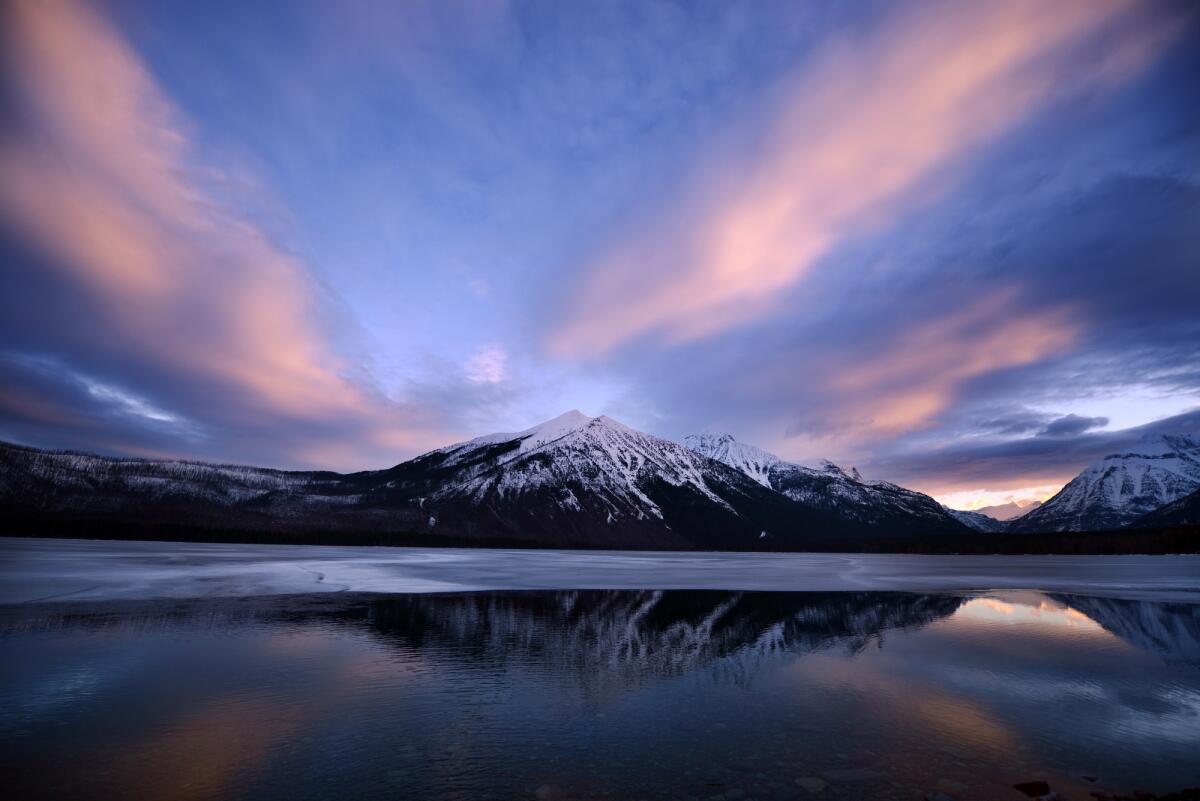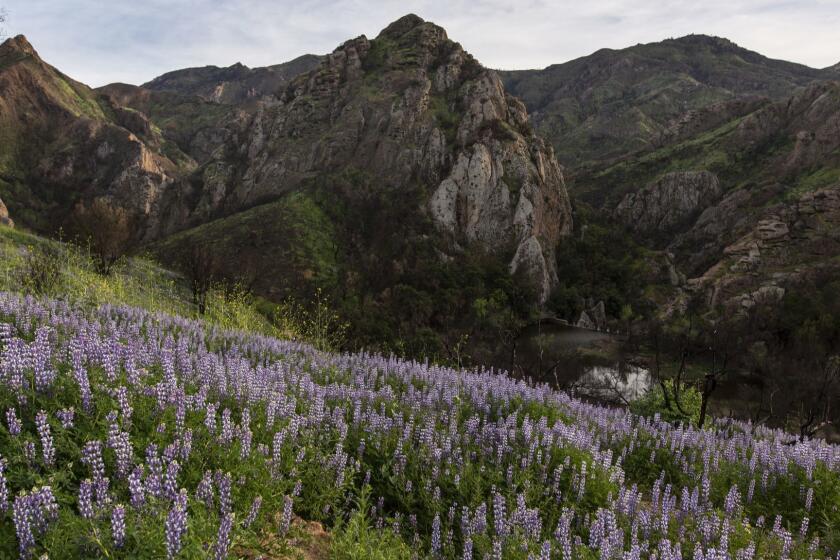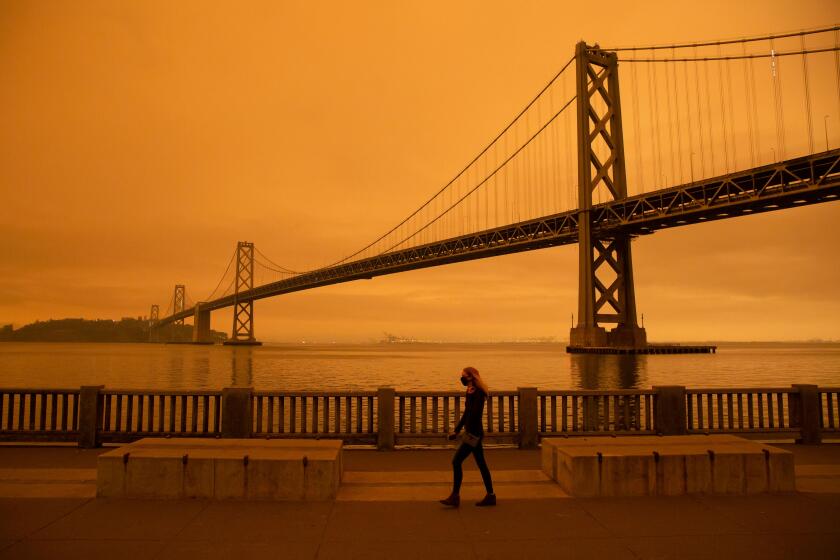The story behind that Patagonia tag, and how the Trump era changed outdoor recreation
- Share via
Browse Patagonia’s online shop, and you’ll find T-shirts condemning Big Oil, encouraging people to vote with planet Earth in mind and declaring that when it comes to wilderness, Americans must “defend it or lose it.”
But the company is getting far more attention for a cheeky, hidden message that appears only on the tag of a limited-edition pair of shorts, in tiny print.
The message: “VOTE THE ASSHOLES OUT.”
The label, which went viral on Twitter, was only the latest Trump-era call to action from Patagonia. The company has responded to the federal government’s environmental rollbacks with increasingly vocal campaigns to protect the country’s public lands — and yes, it says the four-word message applies to the president, along with other politicians who refuse to act on climate change.
Patagonia isn’t alone. As more Americans have taken up hiking, hunting and other forms of outdoor recreation, retailers selling tents, snowboards and weather-resistant jackets have become more politically active over the last few years.
That doesn’t usually take the shape of a profanity-laced political statement. For many companies, it has meant pushing state and federal officials to support greater use of public lands for recreation, as opposed to extractive uses such as mining, logging and oil and gas drilling.
“Around four or five years ago, the discussion started to change pretty dramatically,” said Jordan Smith, director of the Institute of Outdoor Recreation and Tourism at Utah State University.
The National Park Service reported 327 million visits last year, a number that has steadily risen. And as the outdoor recreation industry has grown, so has its political muscle. The U.S. Bureau of Labor Statistics calculated in 2018 that outdoor recreation is a $374-billion business that accounts for 2% of the U.S. economy. An industry trade group thinks the numbers are even bigger, estimating in 2017 that outdoor recreation supports 7.6 million jobs and drives $887 billion in annual consumer spending.
The Trump administration’s policies, meanwhile, have threatened public lands and waters. Over the last four years, the federal government has sought to expand the footprint of oil and gas drilling and has done little to confront the climate crisis, which threatens beloved outdoor spaces through rising temperatures, diminished snowpack and more destructive fires than ever before.
Outdoors enthusiasts aren’t a uniform bunch. They might include Angelenos shopping for tents at REI before hitting the road to Joshua Tree National Park, Phoenix-area suburbanites picking fishing gear at Bass Pro Shops before a road trip to Lake Mead or rural Wyoming residents stocking up on ammunition before heading out for a hunt. They span all political persuasions.
But what they tend to have in common is strong support for policies that protect the places they love.
“These companies are very acutely aware of what their customer base is,” Smith said. “Outdoor recreation and access on public lands really is a bipartisan point of agreement.”
Our oceans. Our public lands. Our future.
Get Boiling Point, our new newsletter exploring climate change and the environment, and become part of the conversation — and the solution.
You may occasionally receive promotional content from the Los Angeles Times.
That may be especially true in the West, where most of America’s public lands are located. A survey commissioned by the Center for Western Priorities, a conservation advocacy group, found that across five states — Arizona, Colorado, Montana, Nevada and New Mexico — 61% of voters believe the United States should set aside more land as parks and national monuments. Nearly four-fifths of respondents said public lands play an important role in how they vote.
The survey found that 64% of voters in those western states view outdoor recreation companies such as Patagonia and REI favorably, compared to favorability scores of 36% for oil companies and 34% for coal companies.
There’s also extensive polling showing that climate change is a growing concern for all Americans, regardless of political party.
Add it all together, and supporting climate action and public lands protection can be smart business for outdoors brands.
“To be a relevant brand today, you need to be doing something on climate, and doing something authentic,” said Amy Horton, senior director of sustainable business innovation for the Outdoor Industry Assn., which is based in Boulder, Colo.
The trade group is preparing to release its first climate policy agenda, which includes protecting forests and other lands that remove heat-trapping gases from the atmosphere; investing in urban green spaces to benefit the 100 million Americans who don’t live near a park; and supporting more renewable energy development, and less fossil fuel extraction, on public lands.
“We’re not doing this just because it’s the right thing to do,” Horton said. “We exist to support the outdoor business community and their needs, and we believe this is a fundamental business imperative. It is an existential threat to the outdoor industry.”

Many companies have reached the same conclusion.
Burton Snowboards, for instance, supported climate legislation in its home state of Vermont and provides funding to Protect Our Winters, which advocates for climate policies to keep winter sports viable in a warming world. The Idaho ski equipment company 22 Designs joined Business Climate Leaders, an initiative of Citizens’ Climate Lobby, to push for ambitious federal policies.
No outdoor retailer has been more out front than Patagonia.
The Ventura-based company has never shied away from politics. Under founder Yvon Chouinard, Patagonia has given 1% of all sales revenue to environmental causes since the 1980s. Before the 2004 presidential election, the retailer launched its first “get out the vote” campaign. The four-word phrase that got so much attention this week has been a saying of Chouinard’s for several years.
The company’s opposition to Trump began early in his presidency.
Patagonia had pushed for the establishment of Bears Ears National Monument in Utah, supporting a campaign led by Native American tribes seeking to protect their ancestral lands. President Obama created the 1.35-million-acre monument in late 2016.
When Trump took office, Utah Gov. Gary Herbert and the state’s congressional delegation began urging the newly elected president to undo the federal protections. Patagonia and smaller outdoor recreation companies protested by declaring that they would boycott the industry’s largest trade show, Outdoor Retailer, which had been held in Salt Lake City for many years.
Just one month into Trump’s presidency, in February 2017, Outdoor Retailer announced that it would pull out of Salt Lake City.
“That was a great indicator of the industry being willing to throw its weight around,” Smith said.
In this week’s climate and environment newsletter, we’re talking dam failures, clean hydrogen and a volcanic eruption.
When Trump did end up dramatically scaling back Bears Ears, outdoor retailers made their displeasure known.
Arne Arens, president of the North Face, described the president’s decision as “deeply disappointing, considering public lands serve as one of the country’s great uniting forces.” REI said America’s outdoors “have benefited from longstanding support on both the left and the right,” and Trump’s decision “hurts the people who love these places.”
Patagonia went further, suing Trump to reverse his decision. The lawsuit is ongoing.
“There are 100 environmental regulations that the Trump administration has tried to roll back that we are equally alarmed about and are trying to stop,” said Corley Kenna, Patagonia’s director of communications. “We will continue to use what’s available to us to stop these rollbacks and to protect our planet.”
Patagonia and REI both support the “30 by 30” movement, which seeks to protect 30% of U.S. lands and waters by 2030. In 2018, Patagonia endorsed Senate candidates for the first time, urging voters to support Sen. Jon Tester, who was running for reelection in Montana, and then-Rep. Jacky Rosen, who was challenging a Republican incumbent in Nevada. Both candidates won.
Patagonia is going further this year, making “recommendations” for 22 of the 35 Senate seats up for grabs in November based on the candidates’ stances on climate change, public lands and environmental justice. The company is backing one independent; the rest of its preferred candidates are Democrats.
As California suffers through fires and heat storms, Joe Biden and Donald Trump couldn’t be any more opposed on climate change.
Trump hoped to protect two vulnerable Republican incumbents, Sen. Steve Daines of Montana and Sen. Cory Gardner of Colorado, by signing a public lands bill they championed. The Great American Outdoors Act sets aside billions of dollars for reducing the National Park Service’s maintenance backlog and acquiring lands for the federal government to protect.
The bill didn’t change Patagonia’s perspective on the two senators’ climate and conservation records. The company endorsed their Democratic challengers: Gov. Steve Bullock in Montana and former Gov. John Hickenlooper in Colorado.
“The last two years, you’ve seen the House pass a lot of climate policies, and they’ve gone to die in the Senate,” Kenna said. “We think electing more leaders in the Senate that will prioritize strengthened climate policies is fundamental.”
The Outdoor Industry Assn. is taking a more cautious approach, endorsing nine incumbents for reelection to the House of Representatives (five Democrats and four Republicans). As part of its 2020 voters guide, the trade group is also highlighting six Senate races and four gubernatorial contests, detailing the candidates’ positions on climate change, public lands and international trade.
The vast majority of outdoor retailers haven’t endorsed political candidates. But many have joined the “Time to Vote” initiative that Patagonia helped found in 2018, which has resulted in more than 1,000 companies across the U.S. economy committing to giving their employees enough time to vote on election day. Patagonia is also urging customers to “make a plan to vote,” offering a digital tool that uses home addresses to help find a polling place or learn how to vote by mail. REI’s website features a similar page.
One thing you won’t find on Patagonia’s website? The shorts with that provocative tag. They’re already sold out.









